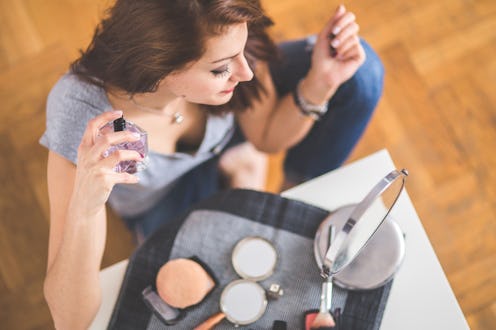Style
11 Products Dermatologists Wish You'd Stop Using

There are so many beauty products on the market that it can be hard to tell which are actually good and which are a waste of money — or worse, bad for your skin. There are a number of common beauty products dermatologists wish you would stop using, even if you read about them all over the internet or hear about how amazing they are from your friends. There's always a better option out there, and you might be surprised to find that once you make the switch, your skin will feel better than ever.
"So many women end up using bad products because they go to different beauty counters, beauty stores, spas, salons, and drug stores, and everyone tells them about the 'must-have" products," says dermatologist Dr. Nazanin Saedi over email. "Women often think that having complex beauty regimes and using a lot of products is best, but that is not the case. I ask my patients to bring in their products and we end up putting most of the products they’re using away."
To make sure you're not wasting your money, and more importantly, you're not harming your skin, consider ditching these 11 common beauty products and switching to their alternatives instead.
1Harsh Scrubs
Most people like to exfoliate, but physical exfoliants are aggressive and can strip the skin. "This causes dryness and eczema to worsen, especially during winter months," says Batra. "Avoid ground pits, since the sharp edges can be irritating and cause micro tears in the skin." Instead, Batra recommends chemical exfoliants such as alpha or beta hydroxy acids or retinol. "These stimulate cell turnover more gently and have anti-aging properties," she says.
2Heavily Scented Products
Fragrances are in everything from laundry detergent to lotions. "The average fragrance product contains 14 chemicals that are not disclosed on the label, along with another 15 listed," says according to dermatologist Dr. Sonia Batra, recurring co-host of The Doctors, over email. "Frequently, mixes of chemicals are not disclosed since they are considered 'trade secrets.' Fragrances can be allergens, hormone disruptors, and carcinogens." Even though they smell nice, you should look with products that are unscented or that contain just essential oils.
3Hair Removal Creams
If hair removal creams sound too good to be true, it's because they are. "The active ingredients can cause severe, burn-like rashes due to contact allergies," says Batra. "Instead, I recommend laser hair removal, shaving, threading, or waxing."
4Formaldehyde-Based Hair Products
Formaldehyde is a carcinogen, an irritant to the skin, hair and eyes, and can cause hair fragility, says Batra. "This is found in hair dyes, shampoos, and straightening treatments such as a Brazilian blowout," she says. "I recommend reading labels for ingredients and asking a stylist about both formaldehyde and formaldehyde-releasing chemicals in any treatment."
5Alcohol-Based Toners
Most toners are usually alcohol-based, which can be harsh on the skin. They strip the skin of natural oils, leaving it dry and prone to damage. "If you can't break from the habit, look for a gentler, alcohol-free version with soothing ingredients like rose water, green tea, camomile or witch hazel," says Tsippora Shainhouse, MD, FAAD over email.
6Over-The-Counter Antibiotic Ointment
Many of these OTC antibiotic ointments contain ingredients like neomycin and bacitracin, which cause contact allergies and in severe cases, anaphylaxis, according to Batra. "Research supports the use of ointment to keep a wound hydrated and thereby speed up healing, but the added component of an antibiotic is not necessary unless a wound becomes red, painful or oozes," she says. "I recommend Aquaphor or Vaseline to any cuts or scrapes and these, coupled with the skin’s immune system, are usually sufficient."
7Acne Products With Benzoyl Peroxide
People with acne are often tempted to use benzoyl peroxide, but it can be extremely drying for the skin. "As an alternative you can use a cleanser with salicylic acid," says RealSelf Contributor Dr. Michele Green over email. It will help dry out your acne without wreaking havoc on the rest of your face.
8Foaming Face Wash
Foaming face wash might feel refreshing at the end of the day, but they can really dry out your skin. "The surfactants in these products are what make them foamy, but their role is to dissolve oil in water," says Shainhouse. "These can remove excess sebum from the day, but will also strip your skin of its natural oils, leaving it feeling dry, tight and potentially irritated, red and itchy. Unless you have very greasy *If you are no longer a teen with greasy skin, look for gel-based or creamy washes that will clean without over-drying your skin.
9Cellulite Creams
Most people get cellulite, no matter their size. "It is genetic and develops when small amounts of normal fat pokes through the net-like arrangement of the structural collagen and fibrous bands under the skin," says Shainhouse. "Cellulite-reducing creams promise to treat and minimize cellulite, but unless they are breaking those bands, they will not cause permanent changes." There's not much you can do other than recognize that cellulite is normal.
10Shea Butter
"So many patients like shea butter or coconut butter for moisturizers for the body and the face," says Saedi. "Many people actually can have an allergy to shea butter, and it can be irritating." Saedi suggests using hyaluronic acid to help moisturize the skin instead. The name might sound scary, but hyaluronic acid is naturally made in our body, and using it as a lotion, cream, or serum can help hydrate your skin.
11Products With Vitamin C & Retinol That Get Exposed To Light
Some products claim to have vitamin C or retinol in them, but if they're exposed to light after they have been opened, then you're wasting your money. "Exposure to light render the products to be worthless, as they oxidize rapidly," says dermatologist Dr. Ava Shamban over email. "Get opaque tubes that seal tightly against air."